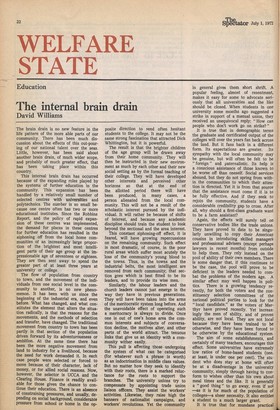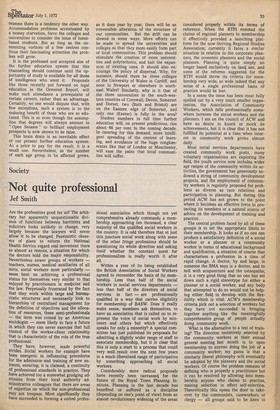Education
The internal brain drain
David Williams
The brain drain is no new feature in the life pattern of the more able parts of our community. There has been much discussion about the effects of this out-pouring of our national talent over the seas. Little, however, has been said about 'another brain drain, of much wider scope, and probably of much greater effect, that has been taking place within this country.
This internal brain drain has occurred because of the expanding roles played by the systems of further education in the community. This expansion has been handled by a relatively small number of selected centres with universities and polytechnics. The number is so small because one centre often has two or more educational institutes. Since the Robbins Report, and the policy of rapid expansion of these centres was implemented, the demand for places in these centres for further education has resulted in the siphoning off from the local home communities of an increasingly large proportion of the brightest and most intelligent parts of their age group at the impressionable age of seventeen or eighteen. They are then sent away to spend the greater part of at least three years at university or college The flow of population from country to town, and the movement of the individuals from one social level in the community to another, is no new phenomenon. It has been with us since the beginning of the industrial era, and even before. What has changed, and what constitutes the element that alters the situation radically, is that the reasons for the movements, and the methods of selection and transfer, have changed. The traditional movement from country to town has been partly in that section of the population driven forward by its adventurousness or ambition. At the same time there has been the more negative movement from land to industry for a livelihood, because the need for work demanded it. In each case people were selected or forced to move because of their character, lack of money, or for allied social reasons. Now, however, the selector is UCCA and the Clearing House. Finance is readily available for those given the chance to continue their education. There is an absence of constraining pressures, and usually, depending on social background, considerable posite direction to send often hesitant students to the college. It may not be the same strong fascination that attracted Dick Whittington, but it is powerful.
The result is that the brighter children of the age group will be drawn away from their home community. They will then be instructed in their new environment as much by each other and their new social setting as by the formal teaching of their college. They will have developed other interests and perceived other horizons so that at the end of the allotted period there will have been produced, in many cases, a person alienated from the local community. This will not be a result of the scholastic interest pursued by the individual. It will rather be because of shifts of interest, and because any academic discipline should train the student to look beyond the sectional and the area interest.
This constant siphoning-off effect, it is feared, will have growing repercussions on the remaining community. Such effect is most dramatic, of course, in the poor rural areas which suffer most acutely the loss of the community's young blood to the towns. Thus, in the towns and the industrial belts, the most intelligent are removed from each community; that section goes which is best fitted to be its leaders, and to provide its wise men.
Similarly, the labour leaders and the church leaders cannot just emerge in the way they have in previous generations. They will have been taken into the arms of the meritocratic system long before. And the unavoidable effect of operating such a meritocracy is always to divide. Once one is out of one's home area the common interests and subjects of conversation decline, the motives alter, and other parts of the world attract. The tenuous links that give us an identity with a community wither easily.
This pull is affecting those undergoing the system of what can be categorised (for whatever such a phrase is worth) as an indoctrination in middle class values. But no matter how they seek to identify with their roots, there is a marked reluctance for the roots to support the branches. The university unions try to compensate by appointing trade union liaison officers. They assist the workers' activities. Likewise, they raise high the banners of nationalist campaigns, and in general gives them short shrift. A popular feeling, almost of resentment, makes it easy for some to advocate seriously that all universities and the like should be closed. When students in one university some months ago suggested a strike in support of a manual union, they received an unequivocal reply: "How can people who don't work go on strike?"
It is true that in demographic terms the graduate and certificated output of the colleges will over the years fan back across the land. But it fans back in a different form. Its expectations are greater. Its sympathy with the local community may be genuine, but will often be felt to be "foreign " and paternalistic. Its help is a conscious assistance of those known to be worse off than oneself. Social services abound, but they do not spring from with in the communities to which their attention is directed. Yet it is from that source that the assistance must come if it is to be fully effective. And if they seek to rejoin the community, students have a considerable credibility gap to cross. After all, why should a first-class graduate want to be a farm assistant?
Again, the effects will surely tell on conservative bodies like the trade unions.
They have proved to date to be singu larly unwilling to copy their American cousins in introducing skilled managers and professional advisers (except perhaps lawyers in recent months) from outside to help them. They rely instead on the pool of ability of their own members. There is some danger that, if this continues to be the case, the pool will prove to be deficient in the leaders needed to com bat the problems of the modern age. A similar effect may well happen in poli tics. There is a glowing tendency re cently, for both the voters and the constituency selection committees of the national political parties to look for the "local candidate," as the voters of Merthyr have proved recently. Yet increas: ingly the men of ability, and of proven ability, are not local. They are not local because they have been trained to be otherwise, and they have been forced to be otherwise by the educational system. The aim of some establishments, and certainly of many teachers, encourages this effect. Some universities have extremely low ratios of home-based students (one, at least, is under one per cent). The student who does stay at home will often be at a disadvantage in the university community, simply through having to con form to wishes other than his own about meal times and the like. It is generally a "good thing" to go away, even if not —as it is for much of the population of colleges—a sheer necessity. It also entitles a student to a much larger grant. reasons there is a tendency the other way. Accommodation problems accentuated by a money starvation, force the colleges and universities to consider the issue of homebased students. But as long as the unremitting vortices of a few centres continue their fascinating attraction the problem will grow.
It is the professed and accepted aim of the further education system that this channelling should continue until the opportunity of study is available for all those of intelligence who want it. Proposals like those recently put forward on legal education in the Ormerod Report, will make such attendance a prerequisite of certain careers, rather than an advantage. Certainly, no one would dispute that, with few exceptions, such a system is to the enduring benefit of those who are so educated. This is so even though the assumption that degrees will always amount to "Open Sesame" to brilliant employment prospects is now shown to be false.
This brain drain is an inevitable effect of our present further education system. As a price to pay for the result, it is a small one. Nevertheless, as the number of each age group to be affected grows, as it does year by year, there will be an irreversible alteration of the structure of our communities. But the drift can be slowed in some ways. More efforts can be made to spread the universities and colleges so that they more easily form part of local communities. This problem should stimulate the creation of more universities and polytechnics, and halt the expansion of existing ones. It should also encourage the policy of dispersal. Why, for instance, should there be three colleges of the University of Wales in Cardiff, and none in Newport or elsewhere in southeast Wales? Similarly, why is it that of the three universities in the south-western counties of Cornwall, Devon, Somerset and Dorset, two (Bath and Bristol) are on the Eastern edge of Somerset, and only one (Exeter) is fully in the area?
Student numbers in full time further education will, on present predictions, rise about 66 per cent in the coming decade. In catering for this demand, more intelligent spreading of the centres of learning, and avoidance of the huge conglomerates like that of London or Manchester, will ease the pains that local communities will suffer.























































 Previous page
Previous page